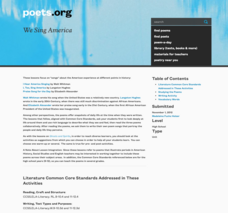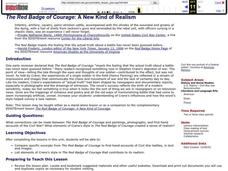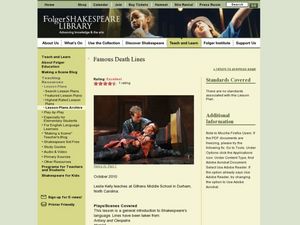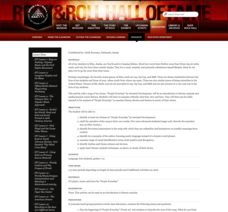Southern Nevada Regional Professional Development Program
Close Reading in the Classroom
Close reading is key to the analysis and interpretation of literature. A close reading of the title and the epigraph of “The Love Song of J. Alfred Prufrock” offers readers an opportunity to examine how even single words or names can...
Shakespeare Uncovered
Merely Players
“. . . one man in his time plays many parts,/His acts being seven ages.” Jaques famous speech from Act II, scene vii of As you Like It sets the stage for an examination of the roles people play. Class members not only consider the roles...
Curated OER
What Are the Advantages and Disadvantages of Conforming?
Dive into Arthur Miller’s The Crucible and determine what it means to conform in society, and discuss as a group with the thoughts and plans available in these documents. Included are multiple activities and brain targets that form the...
Academy of American Poets
We Sing America
Pair the famous poems "I Hear America Singing," by Walt Whitman, and "I, Too, Sing America," by Langston Hughes, with a more recent poem by Elizabeth Alexander called "Praise Song for the Day" to demonstrate a theme and introduce your...
Curated OER
From Light to Dark and Back
Experiment with light and dark in a series of interactive activities that lead up to reading and writing poetry. Class members have the opportunity to observe their feelings while sitting in the light and dark and to play with shadow...
Pulitzer Center
"Voices from Haiti": Using Poetry to Speak up for a Cause
Explore a real world use of poetry with your class! Young language arts pupils consider the concept of advocacy and how journalism, photography, and poetry can raise awareness for a cause. They read several poems about individuals...
Curated OER
Self-Monitoring Strategies and Vocabulary Games
Middle and high schoolers identify how to discover a word's meaning by exploring context clues and any pictures, diagrams, photographs, and charts that might be included. They continue this process with other examples and locate one on...
Curated OER
"Shooting an Elephant"
Study selected vocabulary terms in George Orwell's "Shooting an Elephant." A chart includes five selections, and learners must record the connotative and denotative meaning for each. A great look at using the context to define vocabulary...
National Endowment for the Humanities
Tales of the Supernatural
Scary stuff! Whether approached as the first horror story or a "serious imaginative exploration of the human condition," Frankenstein continues to engage readers. Here's a packet of activities that uses Mary Shelley's gothic novel to...
National Endowment for the Humanities
The Beauty of Anglo-Saxon Poetry: A Prelude to Beowulf
Riddle me this! What do kennings, caesura, and alliteration have to do with the Nowell Codex? Introduce class members to Anglo-Saxon poetry and prepare readers for a study of Beowulf with a series of activities that includes asking...
Curated OER
The Red Badge of Courage: A New Kind of Realism
Is it possible to tell a true war story? Tim O’Brien says that fiction is for “getting at the truth when the truth isn’t sufficient for the truth.” To get at the truth about war, class members examine primary source materials from the...
Curated OER
Shizuko’s Daughter: Knowledge Rating Scale
How well do your kids know key terms from Shizuko's Daughter by Kyoko Mori? Have them review a list of words that they will encounter in the novel, and mark which words they know well, which words they've seen before, and which words...
Curated OER
Shizuko’s Daughter: List-Group-Label Strategy
Help your learners navigate the vocabulary of Shizuko's Daughter by Kyoko Mori with a lesson on categorizing words. After coming up with a list of things that grow from the earth, learners decide which categories each words belong in.
Curated OER
Shizuko’s Daughter: Before, During, After Lesson Plan
Shizuko's Daughter by Kyoko Mori presents a vivid picture of Japanese culture and history. As kids read through the third chapter, they find novel-specific vocabulary to enhance their understanding and use context clues to determine...
Poetry Internation Volume 17, 2011
Alliteration, Consonance, and Assonance in Poetry
Three poems, “Under the Mangoes” by Jacqueline Bishop, Eleanor Wilner’s “What It Hinges On,” and Robert Frost’s “Stopping by Woods on a Snowy Evening,” provide the text for an examination of alliteration, consonance, and assonance. After...
Shmoop
ELA.CCSS.ELA-Literacy.RL.11-12.4
Your assessment is to figure out if I am being figurative or connotative with this statement: This is a great resource. Can’t do it? Then you had better review how to break down Common Core skill RL.11-12.4. In simple language that you...
Curated OER
Hotel on the Corner of Bitter and Sweet: A Novel
Jamie Ford’s historical novel, Hotel on the Corner of Bitter and Sweet, explores the relationship between a young Chinese American boy and a Japanese American girl set against the backdrop of Seattle during World War II. The teaching...
Curated OER
Famous Death Lines
High schoolers examine Shakespeare's language. They select and explore death scenes from plays that they're familiar with and practice delivering famous death lines to one another. They should attempt to recreate the emotions that they...
National Endowment for the Humanities
Thirteen Ways of Reading a Modernist Poem
High schoolers analyze modernist poetry and the role of speaker in example poems. Learners study modernist poems from the Romanticism and Victorian periods as well as Wallace Stevens' "Thirteen Ways of Looking at a Blackbird." Using a...
Curated OER
The Rock and Roll Hall of Fame
"People Everyday" offers class members an opportunity to develop their literacy analysis skills and to develop media literacy. Guided by an included list of discussion questions, groups examaine the word choice, literary devices used,...
Curated OER
Creating Dramatic Monologues from The Grapes of Wrath
The characters in The Grapes of Wrath come to life through an activity that asks groups to craft a dramatic monologue for a character in John Steinbeck's National Book Award and Pulitzer Prize winning novel. Writers are challenged to...
National Endowment for the Humanities
Charles Baudelaire: Poète Maudit (The Cursed Poet)
After learning the main ideas of the Decadent movement, learners work in small groups to read and translate poems by the French poet Charles Baudelaire using basic etymology skills. They then read the accurate English translations to see...
Curated OER
Shakespeare's Macbeth: Fear and Motives of Evil
Learners complete play and vocabulary analysis for William Shakespeare's Macbeth. In this Macbeth analysis lesson, students use an online research engine to locate passages that highlight Macbeth's response to fear and his descent into...
Curated OER
Create a Video Poem
Collaborate to create a visual version of a poem using video. Before class, choose a poem to pick apart. Read it aloud and then analyze it in detail as a class. Assign a line or short section to each student to expand upon using a...

























